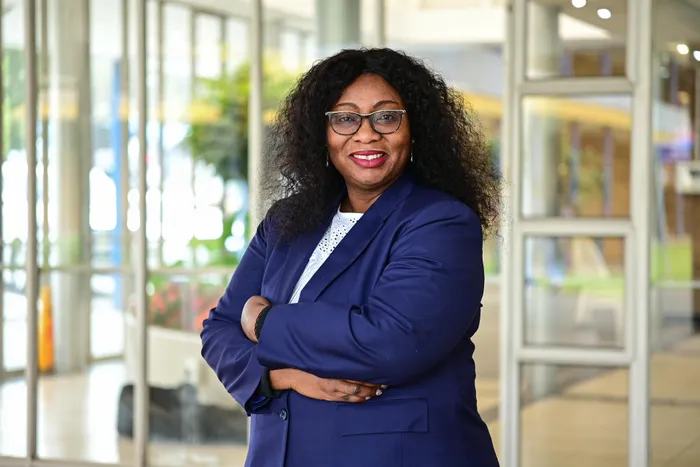
Dr Grace Kanakana-Katumba is the deputy vice-chancellor for Teaching and Learning at the Vaal University of Technology.
Image: Supplied
Each year, thousands of young South Africans step through the gates of universities with burning ambition. Many are the first in their families to enter higher education, carrying the weight of expectation and the hope of using education to change not only their own lives, but the lives of their communities. Yet too many never make it to the finish line.
For every student who wears a graduation gown, four or five others slip away, defeated by financial strain, underprepared by unequal schooling, or alienated by institutions that feel unwelcoming. This is not just a statistic. According to South Africa’s highest levels of educational attainment (HLEA) commissioned by the Department of Higher Education and Training (2024) notes that at least those with secondary education as their HLEA increased from 27.4% in 2015 to 33.0% in 2023. And yet, in the middle of this crisis, there is a source of hope: the transformative power of educators.
The United Nations Educational, Scientific and Cultural Organization (UNESCO)’s 2025 theme for World Teachers’ Day is ‘Teachers: leading in crisis, reimagining the future.’ Nowhere is that call more urgent than in South Africa, where the stakes are existential. A nation cannot thrive if its students cannot graduate. And students cannot graduate if we ignore the one factor that matters most: the person at the front of the classroom.
Teaching is not “chalk and talk.” It is about lighting pathways of possibility. It is about showing a rural learner how mathematics can build a bridge in their own village. It is about telling a young woman from a township that her voice is not just valid but vital.
Students may forget the details of a textbook. But they will never forget the lecturer who believed in them, who challenged them, who made them feel they belonged in lecture halls that often feel like foreign ground.
I learnt this lesson long before I became an academic. As a project manager at the Automotive Industry Development Centre, I trained small businesses in systems improvement. Watching them grow through the practical application of knowledge was profoundly rewarding. It convinced me that education is the most powerful form of empowerment. That conviction shapes my work today as deputy vice-chancellor for Teaching and Learning at the Vaal University of Technology (VUT).
Teachers are shifting from information givers to facilitators of learning, requiring strong digital skills for 21st-century teaching. Teacher education reform is vital, with institutions investing in lecturer development. Beyond technical expertise, all lecturers should hold teaching qualifications, ensuring they integrate effective pedagogy and digital tools into classroom practice. Right now, many are not. Underpaid, overstretched, and under-recognised, too many educators are asked to build a house with no bricks. When they burn out, students suffer.
If we are serious about fixing higher education, we must put educators at the centre of the solution. That means investing in their professional development, rewarding excellence in teaching (not just research), and building institutional cultures that prize mentorship as highly as publications.
Of course, educators cannot do it alone. Students arrive underprepared because of under-resourced schools. They struggle financially because allowances fail to cover the true cost of living. They buckle under stress because mental health services are stretched thin.
This is why collaboration matters. Government, universities, industry, and communities must rally around students the way a village rallies around a child. Tutoring networks, psychosocial support, and stronger school-to-university pipelines are not luxuries; they are lifelines.
Inclusivity must also go beyond slogans. Students succeed when they feel seen and valued. That means curricula that reflect African perspectives, teaching that embraces diverse learning styles, and classrooms where belonging is the rule, not the exception.
At VUT, we are determined to turn these principles into practice. Our Strategy 2033+ places Teaching and Learning at the heart of the academic project. We aim to produce competent, innovative, and technologically empowered graduates ready to confront South Africa’s industrial and societal challenges. Project-based learning, work-integrated education, and the adoption of digital tools are central to this approach.
Equally important is fostering a culture of lifelong learning and transformation. That means ensuring that women are not tokens but equal participants in shaping institutional culture, and that mentorship and equity walk hand in hand with excellence.
The national conversation on higher education has been stuck in the wrong places. What is missing is recognition of the human engine that drives success: educators. South Africa’s future will not be built in boardrooms or parliaments alone. It will be built in lecture halls, classrooms, and labs, by educators who see their work as a calling, and by a society that empowers them to fulfil it.
If we continue treating education as a revolving door, where students enter full of promise and leave disillusioned, we will betray a generation. But if we embrace the transformative power of educators, supporting them with the resources, recognition, and respect they deserve, we can change the story.
Because the future of South Africa depends not only on whether young people enter university, but on whether they leave as graduates, and on the educators who make that possible.
Dr Grace Kanakana-Katumba is the deputy vice-chancellor for Teaching and Learning at the Vaal University of Technology.
Related Topics: